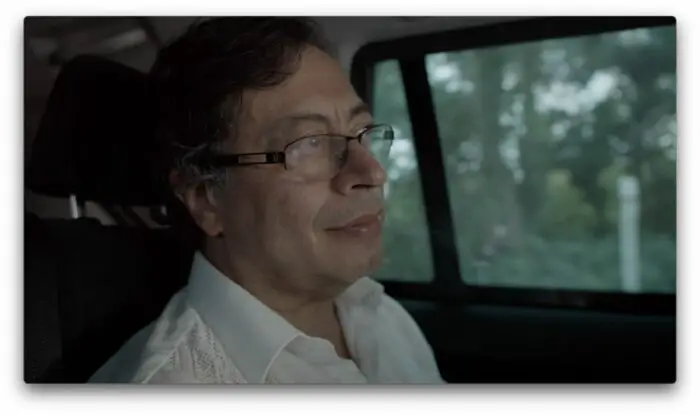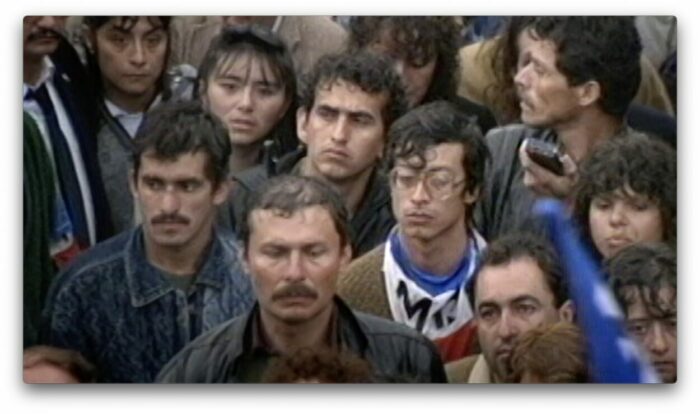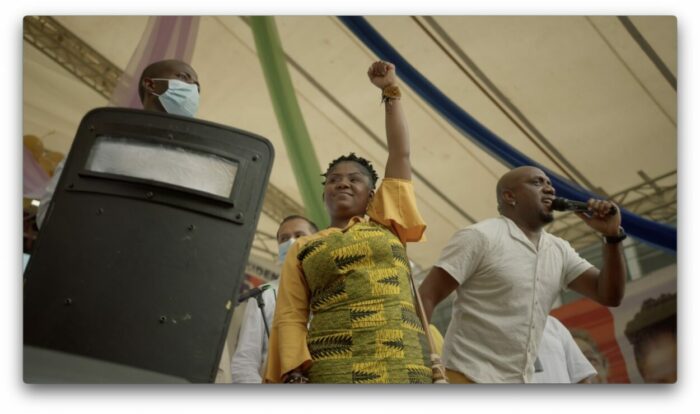Could a former guerilla come to peaceful power through a free and fair election? Across the world, unlikely contestants have come to—or near—their respective countries’ presidencies. Of them, Gustavo Petro, in Colombia, has been as unlikely as any. Neither a businessman nor a television celebrity, Petro is a former M-19 guerilla who fought for his cause decades ago and came to challenge for his country’s presidency in 2022. The new documentary Petro, premiering at several festivals and now at Slamdance, provides unprecedented access to Petro’s historic campaign to become the first ever left-wing president in his country’s history. Part history, part verité, part exposé, Petro bravely presents a key moment in not only Colombia’s democracy—but the world’s.

Petro is a documentary few could direct. While the film’s narrative begins in September 2021 at the launch of his campaign, Emmy-award winning filmmakers Sean Mattison and Trevor Martin had filmed a documentary short with Gustavo Petro in 2007. They weave together footage from that short, never-before-seen archival content, and their own vérité coverage from more than a full year spent following Petro’s campaign trail in 2021-22. The film also has footage from several key interviews, including Petro himself, his family members, running mate, and even his key rivals for the presidency. One figure not featured, having declined an interview: former president Álvaro Uribe Vélez, whose efforts to demobilize the paramilitary in Colombia were accompanied by the killing of 6,402 Colombian civilians in the “False Positives” scandal there. Uribe’s rule and that scandal cast a funereal pall over the campaign, the film, and the country.
As a presidential candidate, Petro campaigns on a platform of peace, progress, and prosperity, positioning himself as an alternative to the draconian rulers of Colombia’s past. But his youth was violent as well. Petro was well known for having served as a young M-19 guerrilla, taking up arms against his country’s rule at age 17 under the pseudonym “Aureliano” (from Gabriel Garcia Marquez’s One Hundred Years of Solitude). The M-19 group took responsibility for the shooting deaths of 13 Colombian politicians as well as kidnappings and armed seizures. Later, Petro befriended leader Carlos Pizarro (who later became a senator and presidential candidate, only to be assassinated). Petro was captured and tortured by the Colombian state; upon his release, he resolved to negotiate peace, demobilize the M-19, and from there entered traditional politics, winning a seat in Congress, then the Senate, then Mayor of Bogotá (a position second in power in Colombia only to the presidency).

Watching Petro‘s contemporary footage of his presidential campaign, it’s hard to reconcile the candidate’s calm and resolute demeanor with his violent past. Yet the film Petro presents that history in full, with archival footage of the younger Petro’s guerilla activism and his ascendancy through the political system. Despite, or perhaps as a consequence of, his past, Petro makes for a charismatic candidate, fearless in criticizing his country’s right-wing leadership, and a symbol of hope for the left. “¡Petro! ¡Amigo! ¡El pueblo está contigo!” shout the crowds at his campaign rallies, enchanted by his promise of a more inclusive cabinet: his running mate, Francia Márquez, is an Afro-Colombian human rights and environmental activist who galvanizes her community in his support, herself also the subject of a new documentary, Igualada, premiering at Sundance.

Together, the duo present themselves as the hope of a more equitable and peaceful future, a generational opportunity to redress entrenched inequalities and the country’s brutal poverty and unemployment. Yet their criticism of the right only engenders the vitriol of their opponents, who claim Petro’s election will spell doom for the struggling nation. As Petro is chided for forgetting his Kevlar vest, one is reminded that the propensity for political violence has never gone away in Colombia.
Filmmakers Mattison and Martin present that scene early on, in part so that the history of violence in Colombian politics always threatens to collide with its present. (The campaign was suspended for a time when Petro learned of a planned attack plotted by La Cordillera gang.) With the 2022 presidential campaign providing the film’s narrative frame, the two work backward from there to Petro’s M-19 days, the assassination of Pizarro, and finally Petro’s ascendancy through the conventional political system to his bid for the country’s presidency, doing so primarily with archival footage and interviews interspersed with key moments in the current campaign. That they were able to secure interviews not only with Petro’s inner circle but also with some of his fiercest rivals—who do not hold back their words in characterizing the man they see as the next next Hugo Chávez—is an impressive feat.
The film’s final act conveys the result of the 2022 election. It’s no secret that Gustavo Petro was the surprise winner, Colombia’s first-ever left-wing President, elected after two prior failed campiagns (in 2010 and 2018). Nor is it any secret that Petro’s first years in the position have been fraught with difficulty and scandal. Nonetheless, and whether one believes the man the best hope of a future generation or the radical who will lead Colombia to its economic doom, Petro presents, with authentic detail and economical storytelling, a film that not only presents a key part of Colombia’s political history but also one that speaks to the universal challenges—the intense polarization, economic inequality, social injustices, and system corruption—of the 21st century. Whether Petro’s presidency succeeds or not, Petro, the film, depicts his election as the culmination of years’ worth of grassroots action and a collective, optimistic campaign for peace.




